Today we’ll walk you over some of the most common speaker wire connecter types used today.
Speaker cables carry the electrical currents from your amp or receiver to your speakers. An important part of the audio setup yet the connection is often overlooked.
It’s essential to use the right cable connector as it helps to optimize the audio signal until it reaches the final speaker components. Using the wrong speaker cord type and connector can cause signal loss and this will greatly affect your end sound.
It’s a small component but understanding which connector types to use with your speaker terminal does offer a big advantage. There are various plug types to choose from but we’ve narrowed it down to seven of the best wire plug designs.
1. Phono (RCA) Connectors
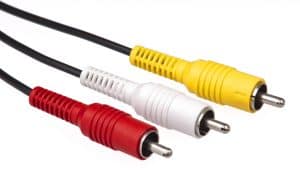 The RCA connectors have been used widely within audio devices since its introduction in the 1940s. For audio devices intended for casual use in homes, the RCA connectors are by far most common. They’re small, cheap and easy to use. For that reason, they’ve become so popular that you rarely see a household without them nowadays. While many of the newer TVs have moved on to using HDMI, products such as record players still use the design to a great extent.
The RCA connectors have been used widely within audio devices since its introduction in the 1940s. For audio devices intended for casual use in homes, the RCA connectors are by far most common. They’re small, cheap and easy to use. For that reason, they’ve become so popular that you rarely see a household without them nowadays. While many of the newer TVs have moved on to using HDMI, products such as record players still use the design to a great extent.
The advantages of phono connectors are that they’re highly affordable and easy to work with. They’re less monstrous than e.g. XLR cables.
The disadvantages of RCA cables are that each signal requires its own plug. This can lead to unnecessary clutter in even the simplest of audio setups. This is definitely something that can trigger the inner demons of any audiophile.
2. Banana Plugs
 As opposed to RCA connectors, Banana plugs offer some kind of security against accidentally getting pulled out with little to no contact. This single-wire (one-conductor) electrical connector offers a good steady fit and excellent electrical conductivity. Banana connectors are 4mm in size.
As opposed to RCA connectors, Banana plugs offer some kind of security against accidentally getting pulled out with little to no contact. This single-wire (one-conductor) electrical connector offers a good steady fit and excellent electrical conductivity. Banana connectors are 4mm in size.
Banana connectors can plug into specifically matching Banana jacks as well as 5-way binding posts.
One of the biggest pros of these plugs is that they look great. They allow you to quickly and safely make connections without risking any type of corrosion due to them being gold plated.
The major drawback to Banana plugs is the price. These cables can easily cost around $10 a piece and if you’re running an extensive audio setup you may end up with a noticeably higher bill than other connectors would leave you with.
3. Pin Plug
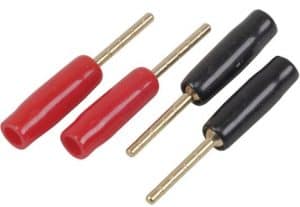 The Pin plug is the smaller version of the Banana Plug. You will find that pin plugs come in sizes between 2mm and 3mm whereas the bigger Banana plugs are 4mm in size. Not a lot of difference in size at all but the Pin plugs do have their own design characteristics. They do not use the spring contact like the Banana plugs but instead use binding posts that are designed with holes through the center.
The Pin plug is the smaller version of the Banana Plug. You will find that pin plugs come in sizes between 2mm and 3mm whereas the bigger Banana plugs are 4mm in size. Not a lot of difference in size at all but the Pin plugs do have their own design characteristics. They do not use the spring contact like the Banana plugs but instead use binding posts that are designed with holes through the center.
A common Pin plug type that you will find is the 2.6mm plug, it’s about 1/3 of the size of the standard Banana plug connector. These come with the same contact styles and sheathed options for high voltage use. The downside to these Pin plugs is that they are fragile and won’t give you as much durability as the standard sized plugs. However, on the plus side, they do come in handy if you need a compact connector or if you require a number of connectors within a tight space.
4. Spade Plugs
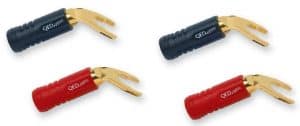 Spade Plugs are a popular choice as they give you one of the most secure and reliable connections. They often come as crimp-on or screw-on styles, the latter being the most common option. To connect the screw-on type you simply place the open part of the U over a five-way binding post and then screw the nut down onto the plug. You will find some spade plugs that are shaped with 3/4 of a circle. People often find these circle types to offer an even stronger connection than the U-shaped design.
Spade Plugs are a popular choice as they give you one of the most secure and reliable connections. They often come as crimp-on or screw-on styles, the latter being the most common option. To connect the screw-on type you simply place the open part of the U over a five-way binding post and then screw the nut down onto the plug. You will find some spade plugs that are shaped with 3/4 of a circle. People often find these circle types to offer an even stronger connection than the U-shaped design.
The main advantage of using a Spade plug is that it offers one of, if not, the best type of connection for speaker wires. They also protect the wire ends from unraveling and keep all the strands inside one safe connection. Spade plugs are secure and give you a quality connection over a long period of time. If we had to suggest one disadvantage then it would be that it does take a bit longer to connect and screw into place, as opposed to the quick and easy Banana plugs.
5. XLR Connectors
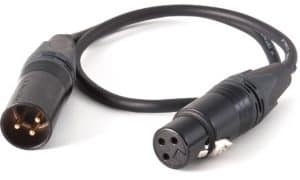 The most common XLR connector is the circular, 3-pin design. You can also find 4, 5, 6, and 7-pin designs in use. Plus, a mini-XLR connector is also available for those smaller projects. You will have no doubt seen these in use in various microphone and audio/video applications. A popular choice of connector in home audio setups and home studios. You will notice that a lot of the XLR connectors come with a locking device that ensures that they can’t be easily pulled out. This is a simple yet extremely useful design feature that users are quick to appreciate.
The most common XLR connector is the circular, 3-pin design. You can also find 4, 5, 6, and 7-pin designs in use. Plus, a mini-XLR connector is also available for those smaller projects. You will have no doubt seen these in use in various microphone and audio/video applications. A popular choice of connector in home audio setups and home studios. You will notice that a lot of the XLR connectors come with a locking device that ensures that they can’t be easily pulled out. This is a simple yet extremely useful design feature that users are quick to appreciate.
The beauty of the XLR connector is that they are reliable and very common if you are an audiophile. You are likely to have one lying around if you need a quick replacement. However, while the XLR connector is perfectly sufficient for low volume performance such as speaker systems. It was never suited for outdoor and larger scale situations.
6. TRS Connectors
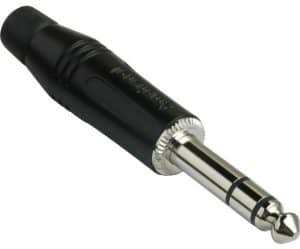 The TRS connector is one of the most well-known connections in the professional audio environment. Widely known as the 1/4” speaker jack type, it can be seen on all sorts of audio equipment. The TRS initials stand for tip, ring, and sleeve. These three terms describe the three contact points of this wire plug design, giving the TRS connector its balanced nature. As opposed to the unbalanced, TS connector design with two contact points (tip and ring). As well as the standard 1/4“ size, the TRS connector also comes in two other useful sizes of 3/32″ and 1/8″.
The TRS connector is one of the most well-known connections in the professional audio environment. Widely known as the 1/4” speaker jack type, it can be seen on all sorts of audio equipment. The TRS initials stand for tip, ring, and sleeve. These three terms describe the three contact points of this wire plug design, giving the TRS connector its balanced nature. As opposed to the unbalanced, TS connector design with two contact points (tip and ring). As well as the standard 1/4“ size, the TRS connector also comes in two other useful sizes of 3/32″ and 1/8″.
The advantages of using TRS connectors is that they are designed to give a more balanced and improved signal-to-noise ratio. The clear disadvantage is that they will be more expensive than their unbalanced TS counterpart. There will be a significant difference in cost when setting up larger scale projects. You do pay more for the balanced and clear signal though it is worth noting that you are not likely to hear the difference between TRS and TS cables under 10ft long. So again it depends on your setup as to which connector type is going to be best suited to you.
7. Speakon Connectors
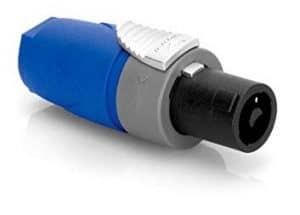 The Speakon connector is a trademarked design that was specially created for professional audio speakers. Other similar designs have been coined “speaker twist connectors” but the Speakon design is widely regarded as the industry standard. You can buy these in 2, 4, and 8-pole designs and they are interchangeable to a certain degree. The 4-pole is the most common type as this allows for bi-amping without the use of two cables (two connections each for both high and low frequencies).
The Speakon connector is a trademarked design that was specially created for professional audio speakers. Other similar designs have been coined “speaker twist connectors” but the Speakon design is widely regarded as the industry standard. You can buy these in 2, 4, and 8-pole designs and they are interchangeable to a certain degree. The 4-pole is the most common type as this allows for bi-amping without the use of two cables (two connections each for both high and low frequencies).
The advantages of the Speakon cable connectors is that they come with a useful locking design, meaning no more connection fallout. They are also able to carry more current than the standard 1/4” phone connectors, in fact, they are specially designed for high current environments. Last but not least, the contacts have been designed so that you experience no shorting when connecting and disconnecting. The Speakon wire plug is designed for the professional audiophile with convenience and safety in mind. The downside to the Speakon plug is that you do pay more for the optimized design, but for most people, this will be worth it in terms of end result.
The post Speaker Wire Connector Types: Their Advantages & Disadvantages appeared first on SoundWiz.

No comments:
Post a Comment